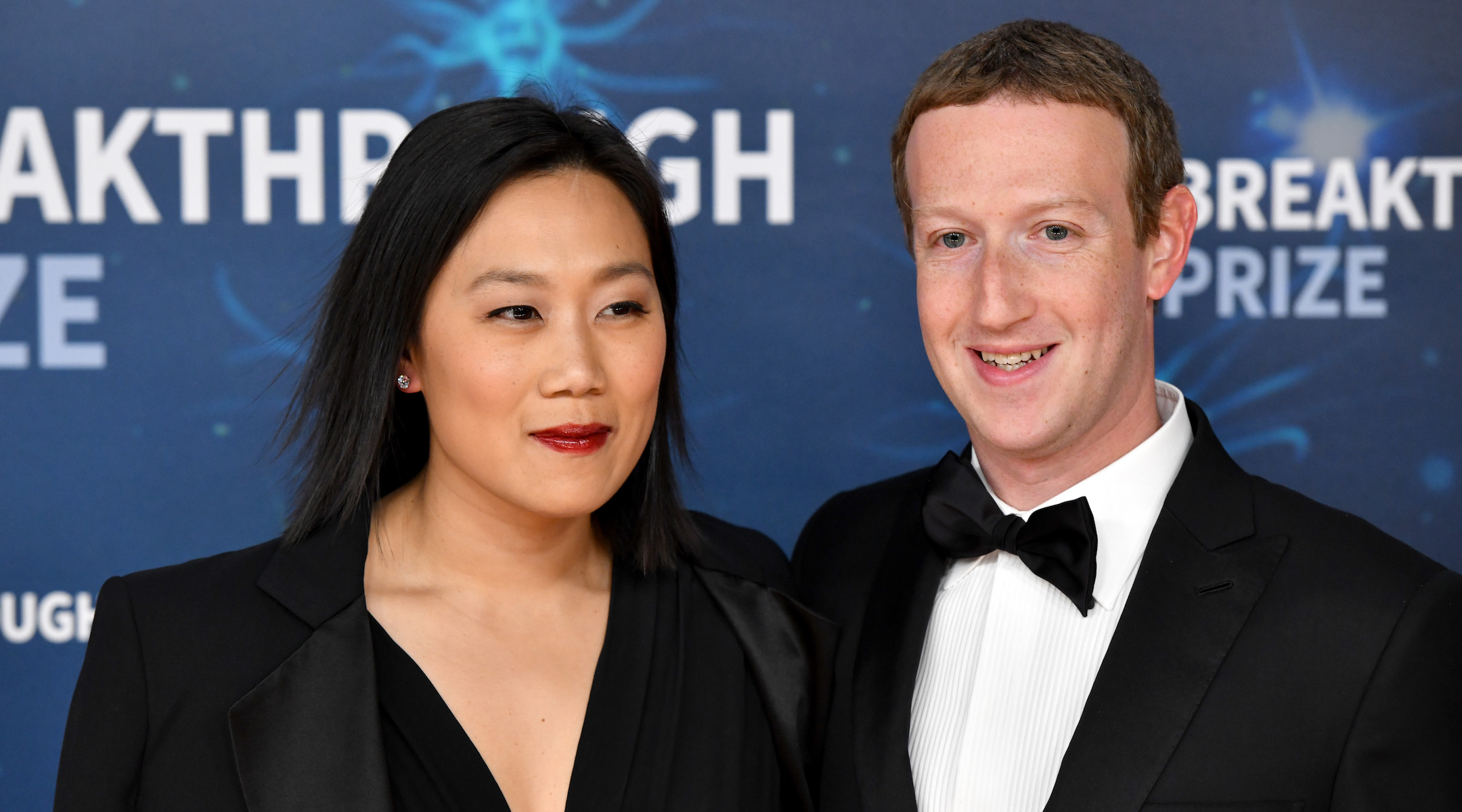Half of America’s 25 most generous philanthropists are Jews. Few give much to Jewish causes.
Of the Jews who made Forbes’ annual list of top philanthropists, only Lynn and Stacy Schusterman of the Tulsa oil dynasty, are prominent donors to Jewish causes

Priscilla Chan and Mark Zuckerberg attend the 2020 Breakthrough Prize Red Carpet at NASA Ames Research Center in Mountain View, California on Nov. 3, 2019. (Ian Tuttle/Getty Images for Breakthrough Prize )
(JTA) — Jews made up nearly half of America’s biggest philanthropic donors last year, according to a calculation by Forbes of who gave the most money away in 2022.
In a year that saw their fortunes take a hit amid declines in the stock market, America’s 25 “most generous givers” donated a collective $27 billion, up from $20 billion in 2021, for a lifetime total of $196 billion, according to Forbes. They included 12 billionaires with Jewish backgrounds — a dramatic overrepresentation when compared to the proportion of Jews in the overall U.S. population.
The Jews on the list include financier George Soros, who gave away at least $300 million to racial justice and humanitarian work in Ukraine and other causes; businessman and former New York City mayor Michael Bloomberg with $1.7 billion in donations to charter schools, clean energy, and fighting heart disease; and Meta CEO Mark Zuckerberg, whose charity donated more than $900 million, with much of the money going to fund research into artificial intelligence and genomics at universities.
One thing that stands out about these Jewish philanthropists is that almost none focuses giving on the Jewish community. Only Lynn and Stacy Schusterman of the Tulsa oil dynasty, who are paired together on the list, are prominent donors to Jewish causes.
To be sure, many, if not all of the others have given at least small amounts to Jewish charities. In 2021, for example, Mark Zuckerberg and his wife, Priscilla Chan, announced $1.3 million in gifts to 11 Jewish groups; last year they distributed more than $900 million in total, according to Forbes. Meanwhile, former Microsoft CEO Steve Ballmer and his wife, Connie, have donated at least $1 million to the Jewish National Fund; they gave away more than $800 million last year. And Michael Dell, the founder of the Dell computing company, donated the land for a Jewish community center in his home of Austin, Texas, and supported a recent renovation.
But only the Schustermans, who donated $370 million last year, have prioritized Jewish giving with hundreds of millions of dollars over their decades of involvement in the Jewish communal world.
It’s hard to make comparisons to the past and say whether Jews at the apex of philanthropy ever tended to focus on Jewish causes because the level of wealth today is almost unprecedented, according to Andrés Spokoiny, the president and CEO of the Jewish Funders Network.
“Historically, individuals, except for during the Gilded Age, perhaps, didn’t amass these types of fortunes, and there weren’t many Jews at this economic caliber,” Spokoiny said.
As to why many of the philanthropists don’t dedicate themselves to the Jewish community, Spokoiny offered three explanations. One is, simply, assimilation. “They don’t necessarily have a strong Jewish upbringing or Jewishness does not play a major role in their lives, and in that way they are not different from the rest of us,” Spokoiny said.
Another reason is that, given their immense resources, some prefer to tackle massive global issues such as climate change or pandemics. And lastly, Spokoiny said, some philanthropists think that being associated with Jewish causes might not fit with their political aspirations or personal brand.
Mark Charendoff, who ran the Jewish Funders Network before Spokoiny, is now president of the Maimonides Fund, which has emerged as a major Jewish charity in recent years. He echoed some of the same explanations as Spokoiny. He also said that in past generations, wealthy Jews who wished to enter philanthropy didn’t always have the option of donating outside the Jewish community.
“Universities, hospitals, symphonies weren’t always excited about having Jewish donors, particularly active ones,” Charendoff said. “Now you would be hard-pressed to find a not-for-profit that isn’t eager for Jewish representation.”
Successful fundraising by Jewish recipients in what Charendoff calls the “more competitive landscape” of today will require long-term investments in fostering Jewish identity, he said.
“If we want the biggest philanthropists to give more Jewishly then we need to invest more in Jewish education and engagement for all Jews,” he said.
Here are the philanthropists with Jewish roots who made Forbes’ “America’s Most Generous Givers” list.
- George Soros: +$300 million in 2022
- Michael Bloomberg: +$1.7 billion
- Jim & Marilyn Simons: +$1.9 billion
- Mark Zuckerberg & Priscilla Chan: +$900 million
- Edythe Broad & family: +$340 million
- Steve & Connie Ballmer: +$800 million
- Sergey Brin: Newcomer to the list
- Lynn & Stacy Schusterman: +$370 million
- Michael & Susan Dell: +$177 million
- Donald Bren: +$470 million
- Dustin Moskovitz & Cari Tuna: +$670 million
- George Kaiser: +$120 million
This article originally appeared on JTA.org.















